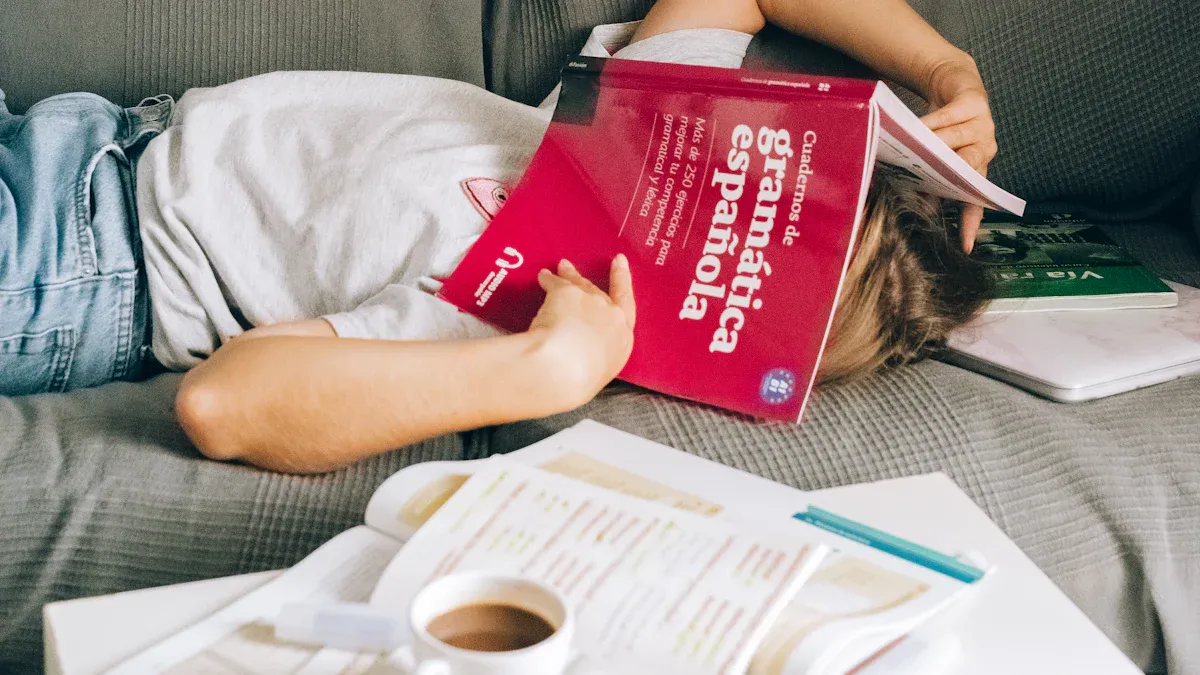
You might enjoy a cup of coffee each morning, but you should know that it can come with some negative effects on your health. Many people report issues when they drink too much coffee. Some of the most common problems include:
Anxiety and stress
Trouble sleeping or poor sleep quality
Nervousness, headaches, or stomach issues when stopping caffeine
Risks for pregnant women, such as reduced fetal growth
Think about how your body reacts to coffee and decide what feels right for you.
Key Takeaways
Drinking too much coffee can lead to anxiety and jitters. If you feel nervous, consider reducing your caffeine intake.
Caffeine can disrupt your sleep. Avoid coffee at least 6 hours before bedtime to improve sleep quality.
Some people may experience digestive issues from coffee. If you have stomach pain or acid reflux, monitor your coffee consumption.
High caffeine intake can raise heart rate and blood pressure. If you have heart concerns, consult your doctor about your coffee habits.
Withdrawal symptoms can occur if you stop drinking coffee suddenly. Gradually reduce your intake to minimize discomfort.
Negative Effects of Coffee

Anxiety and Jitters
You may notice that drinking coffee can make you feel nervous or shaky. These feelings are called anxiety and jitters. Many people experience these negative effects after drinking too much caffeine. Studies show that caffeine can increase the risk of anxiety, especially when you consume high amounts. Here are some important findings:
Caffeine intake is linked to a higher risk of anxiety, with a strong effect seen in adults.
Even low doses of caffeine can raise anxiety, but high doses make it much worse.
If you drink more than 400 mg of caffeine a day, you have a greater chance of feeling anxious.
However, some research suggests that regular coffee drinkers may actually have fewer symptoms of anxiety compared to people who do not drink coffee. This means that your body may react differently based on how often you drink coffee.
If you feel jittery or anxious after drinking coffee, you may want to lower your caffeine intake.
Sleep Problems
Coffee can affect your sleep. Caffeine is a stimulant, which means it keeps you awake and alert. If you drink coffee late in the day, you might have trouble falling asleep or staying asleep. Research shows that caffeine can reduce your total sleep time and make it harder to get good quality sleep.
Study Focus | Findings |
|---|---|
Nationally representative sample | Higher caffeine intake linked to shorter sleep and insomnia. |
College students | 3-5 cups/day linked to at least 6 hours of sleep. |
Military personnel | 3+ caffeinated drinks linked to less than 3 hours of sleep. |
Healthcare professionals | 57.1% reported poor sleep quality with caffeine use. |
Young healthy adults | Sleep quality declined, but sleep duration did not change much. |
Caffeine can also make you take longer to fall asleep and wake up more during the night. On average, caffeine can reduce your sleep by about 45 minutes and increase the time it takes to fall asleep by 9 minutes. Experts recommend avoiding caffeine for at least 6 hours before bedtime to help prevent sleep problems.
Digestive Discomfort
Some people experience digestive discomfort after drinking coffee. You might feel stomach pain, acid reflux, or other digestive issues. Studies have mixed results about whether coffee causes these problems. Some research shows no link between coffee and acid reflux, while other studies suggest that coffee can make symptoms worse for certain people.
Study Type | Findings | Notes |
|---|---|---|
Meta-analysis (Kim) | No link between coffee and acid reflux | OR of 1.06 (95% CI: 0.94–1.19) |
Meta-analysis (Chen) | No association found | 21 studies included |
Various studies | Mixed results; some show aggravation | Individual responses vary |
If you notice stomach upset or acid reflux after drinking coffee, you may be sensitive to its side effects.
Heart Rate and Blood Pressure
Caffeine can affect your heart rate and blood pressure. Drinking coffee, especially in large amounts, can cause your heart to beat faster and your blood pressure to rise. Chronic high caffeine intake, especially over 400 mg per day, increases the risk of high blood pressure and heart problems. People who drink more than 600 mg of caffeine daily may see their heart rate and blood pressure stay high even after resting.
Chronic high caffeine consumption, particularly over 400 mg per day, can lead to increased susceptibility to cardiovascular disease. This includes elevated blood pressure and heart rates, which are significant risk factors for long-term cardiovascular issues. Regular caffeine consumption could disturb the parasympathetic system, leading to elevated blood pressure and heart rates. Those who consumed the highest amounts, chronic caffeine consumption of more than 600 mg of caffeine per day, had significantly elevated heart rates and blood pressure after five minutes of rest following the step test.
If you already have high blood pressure or heart problems, caffeine may make these conditions worse. You should talk to your doctor about your coffee habits if you have concerns about your heart health.
Headaches and Withdrawal
When you stop drinking coffee suddenly, you may experience withdrawal symptoms. These negative effects can start within a day after your last cup. Common symptoms include:
Headache
Fatigue
Low energy
Mood changes
Trouble concentrating
Irritability
Anxiety
Tremors
Stomach discomfort
Withdrawal symptoms can last from 2 to 9 days. Most people feel normal again after two weeks. If you drink too much caffeine and then stop, you are more likely to have these side effects.
If you want to cut back on coffee, try to reduce your caffeine consumption slowly to avoid strong withdrawal symptoms.
Coffee Side Effects and Issues
Medication Interactions
You may not realize that caffeine can interact with many medications. These interactions can change how well your medicine works or cause unwanted side effects. Some common medications that can have problems with caffeine include:
Blood pressure medicine: Caffeine can reduce how much your body absorbs these drugs.
Antidepressants: Caffeine may lower absorption and increase side effects like restlessness.
Antipsychotic medicine: Caffeine can make these drugs less effective.
Osteoporosis medication: Taking these with coffee can make them work less well.
Melatonin: Caffeine can block the calming effects of melatonin, making it harder to sleep.
Alzheimer’s medicine: Caffeine can limit how well these drugs work.
Mixing caffeine with antibiotics or antidepressants can also cause problems. Sometimes, caffeine can make side effects worse, such as a rapid heart rate or trouble breathing. You should always check with your doctor if you take medicine and drink coffee.
Pregnancy and Fertility
Caffeine can affect pregnancy and fertility in different ways. Research shows that drinking coffee during pregnancy may increase the risk of miscarriage, low birth weight, and stillbirth. However, there is no clear link between caffeine and trouble getting pregnant. Experts recommend that pregnant people keep their caffeine intake below 200 mg per day, which is about two cups of coffee.
Finding | Description |
|---|---|
Spontaneous Abortion | Higher risk with coffee consumption |
Fertility Rates | No clear link with natural conception or fertility treatments |
Pregnancy Outcomes | No strong link with preterm birth, but risk of low birth weight and stillbirth |
Tip: If you are pregnant, try to limit your caffeine consumption to stay within safe limits.
Cholesterol Impact
Some ways of making coffee can raise your cholesterol. Unfiltered coffee, like French press or Turkish coffee, has substances called diterpenes. These can increase LDL (bad) cholesterol and ApoB cholesterol. Using a paper filter removes most diterpenes and lowers this risk. If you have high cholesterol, you may want to choose filtered coffee.
Energy Drinks and High Caffeine
Energy drinks often have much more caffeine than coffee. High caffeine intake from these drinks can cause anxiety, insomnia, and headaches. Many energy drinks also have a lot of sugar, which can lead to weight gain, diabetes, and heart disease. Unlike coffee, energy drinks may cause rapid changes in blood sugar and can even lead to serious health problems like heart rhythm issues or seizures.
Coffee is usually safer than energy drinks because it has fewer added sugars and chemicals.
Energy drinks can cause dehydration and heart problems, especially if you drink them with alcohol or exercise hard.
Individual Sensitivity
Not everyone reacts to caffeine the same way. Your genes, age, weight, and even your diet can change how your body handles caffeine. Some people feel jittery or get digestive issues after just a little caffeine, while others can drink more without problems.
Factor | Description |
|---|---|
Genetics | Some people break down caffeine faster than others. |
Age and Sex | Sensitivity can change with age and between males and females. |
Medications | Some drugs can make caffeine’s effects stronger. |
Liver Health | Liver problems can slow down caffeine metabolism. |
If you notice strong side effects from caffeine, you may be more sensitive than others. Pay attention to how your body feels after caffeine consumption.
Caffeine Risks for Special Groups

Children and Teens
You may wonder what caffeine does to children and teens. Many experts warn that caffeine can cause several problems for young people. Here are some common health risks:
Nervousness and irritability
Nausea and stomach pain
Sleep problems and feeling tired in the morning
Racing heartbeat and fast breathing
Body shakes and anxious feelings
Hyperactivity
Osteoporosis and weak bones
Gastric ulcers
Caffeine can show up in foods you might not expect, like ice cream, chocolate, bubble gum, energy bars, and some medicines. Pediatricians recommend that children under 12 avoid caffeine completely. For teens aged 12 to 18, you should keep caffeine below 100 mg per day, which is about two cans of soda or one small cup of coffee. Drinks like soda and energy drinks can also lead to weight gain and tooth decay.
Pregnant and Breastfeeding
If you are pregnant or breastfeeding, caffeine can affect your baby. Experts suggest that pregnant people limit caffeine to less than 200 mg per day. For breastfeeding mothers, less than 300 mg daily is considered safe. Only a small amount of caffeine passes into breast milk. Most studies show no major effects on a baby’s heart rate or sleep. Some research links caffeine to more colic or skin problems, but the evidence is not clear.
Heart and Anxiety Conditions
Caffeine can raise your heart rate and blood pressure. If you have heart problems or anxiety, caffeine may make these conditions worse. You might notice palpitations or feel more anxious after drinking coffee. People with high blood pressure or anxiety disorders should be careful with caffeine because it can increase symptoms.
Digestive Disorders
Caffeine can cause trouble for people with digestive disorders like IBS or GERD. You may experience:
More stomach acid, which can lead to acid reflux and heartburn
Faster digestion, which can cause diarrhea
Higher stress hormone levels, which may worsen IBS symptoms
Irritation of the intestine and damage to the lining
If you have digestive problems, caffeine may make your symptoms worse. You should pay attention to how your body reacts after drinking coffee.
Daily Caffeine Consumption and Safety
Recommended Limits
You may wonder what amount of caffeine is safe for you each day. Health experts agree that most healthy adults can safely have up to 400 mg of caffeine daily. This equals about four cups of brewed coffee. The U.S. Food and Drug Administration also supports this limit. Recent dietary guidelines confirm that moderate coffee consumption, up to 400 mg of caffeine per day, fits into a healthy diet. Staying within this range helps you avoid most negative effects.
Age Group | Safe Daily Limit |
|---|---|
Healthy Adults | Up to 400 mg caffeine |
Teens (12-18) | Up to 100 mg caffeine |
Children (<12) | Avoid caffeine |
Reducing Side Effects
You can take steps to lower the risk of side effects from caffeine. Try to drink coffee in the morning, before 2 p.m. Setting a “coffee curfew” helps you sleep better at night. Limit yourself to 2-3 cups per day to avoid high caffeine intake. Pair your coffee with a balanced breakfast to keep your blood sugar steady.
Stop drinking caffeine if you feel shaky or anxious.
Drink water to stay hydrated and help with jitters.
Keep a log of your caffeine consumption and note how you feel. This helps you spot patterns and make changes.
Tip: If you notice any unwanted effects, cut back on caffeine slowly to avoid withdrawal symptoms.
When to Seek Help
Sometimes, caffeine can cause serious health problems. You should talk to a doctor if you notice:
Trouble falling or staying asleep
Feeling very anxious or irritable
Stomach pain or digestive issues
Fast or irregular heartbeat
Chest pain
Trouble breathing or shortness of breath
Muscle twitching or confusion
Nausea, vomiting, or seizures
If you have any of these symptoms, stop caffeine consumption and get medical advice. Paying attention to your body helps you stay safe and healthy.
You now know what negative effects coffee can have on your health. These include anxiety, sleep problems, stomach issues, and heart concerns. You should watch your daily caffeine intake and notice how your body reacts. Make smart choices about coffee by staying within safe limits.
If you feel unwell after drinking coffee, talk to your doctor for advice.
FAQ
What are the most common side effects of drinking coffee?
You may feel anxious, have trouble sleeping, or get stomach pain. Some people notice a fast heartbeat or headaches. These side effects happen more often when you drink too much coffee.
What should you do if coffee makes you feel sick?
Stop drinking coffee and drink water. You can eat a small snack to settle your stomach. If you still feel sick, talk to your doctor.
Tip: Write down how you feel after drinking coffee. This helps you spot patterns.
What is a safe amount of coffee for teens?
Teens should keep caffeine below 100 mg each day. This equals one small cup of coffee or two cans of soda. Too much caffeine can cause sleep problems and make you feel nervous.
Age Group | Safe Limit |
|---|---|
Teens | 100 mg |
What types of coffee raise cholesterol?
Unfiltered coffee, like French press or Turkish coffee, can raise cholesterol. Filtered coffee removes most of the substances that cause this problem.
What happens if you stop drinking coffee suddenly?
You may get headaches, feel tired, or become irritable. These symptoms usually last a few days. Reduce coffee slowly to avoid strong withdrawal effects.


